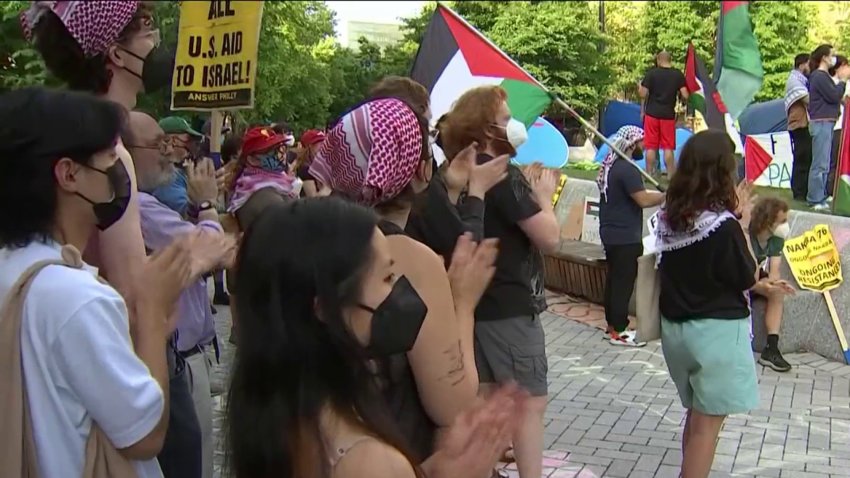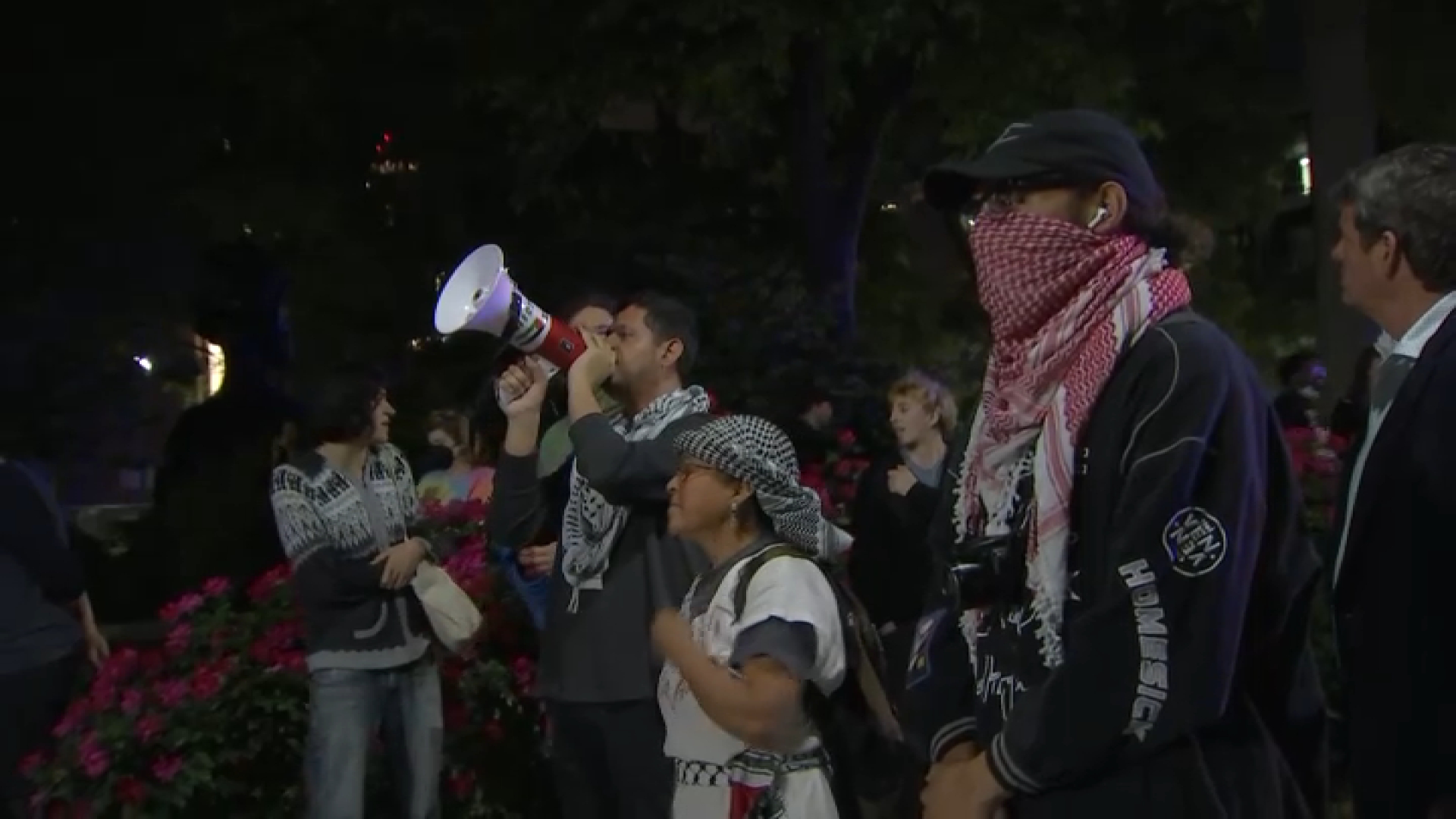Drexel University buildings remain on lockdown as the pro-Palestinian encampment continues on campus. The school did release a statement saying that they would slowly return to normal operations starting Tuesday with some classes in person and lectures remaining virtual. NBC10’s Aaron Baskerville has the latest.
What to Know
- Pro-Palestinian protesters have ignored a request by Drexel University’s president to disband their encampment.
- Drexel plans a "phased return" to normal operations on Tuesday, with labs and some other classes to be held in person and lecture classes to stay remote.
- Drexel President John Fry late Monday said the encampment had disrupted campus life and “cannot be allowed to remain in place."
Pro-Palestinian protesters ignored a request by Drexel University's president to disband their encampment on Monday as arrests linked to campus demonstrations against the Israel-Hamas war surpassed the 3,000 mark nationwide.
Drexel's campus was on lockdown, with classes being held virtually as police kept watch over the demonstration on the school's Korman Quad on Monday. Many Drexel employees were told to work from home.
On Monday night the university released a statement from Drexel President John Fry that said in part, "After conferring with Chief Singleton and his Drexel Public Safety team, I have determined that we have sufficient security in place to begin a phased return to normal operations. Tomorrow, labs, studio classes and simulation classes will return to being in-person, while lecture classes will remain virtual."
Get top local stories in Philly delivered to you every morning. Sign up for NBC Philadelphia's News Headlines newsletter.
At Drexel, which has about 22,000 students, Fry said protesters “have created a hostile, confrontational environment by subjecting passersby to antisemitic speech and by issuing several ‘demands’ that have unacceptably targeted individual members of our faculty and professional staff” as well as Jewish groups on campus. He previously threatened disciplinary action against Drexel students participating in the protest.
Earlier, Fry said as many as 60 protesters were at the encampment:
"Now to the matter of the encampment itself," Fry wrote. "Drexel University safeguards free speech and recognizes the right to peaceful protest, even when such protest features the expression of views that many members of our community might consider objectionable. At the same time, the University has the right both to impose restrictions on any demonstration that disrupts normal operations or creates a threatening, unsafe environment for other members of our community, and to take action against illegal trespassing.
"While reportedly peaceful and respectful of passersby for long stretches of time, this demonstration already has proved extensively disruptive to normal operations. It has forced the cancellation of numerous campus events and placed added strain on our Drexel Public Safety officers, who have been redeployed both to ensure the safety of protesters and passersby and to prevent unauthorized entry into our buildings and facilities. It also compelled us to move to remote learning and operations today."
The Drexel protesters’ demands ranged from the university administration calling for a ceasefire in Gaza and divesting from companies that do business with Israel, to abolition of the Drexel police department and termination of the school’s chapter of Hillel, the Jewish campus organization, and another Jewish campus group, Chabad.
The Drexel Palestine Coalition had no immediate response to Fry's ultimatum. The protest organizers said on Instagram in response to an earlier statement from Fry that “it is slander to accuse the encampment of ‘hateful’ or ‘intimidating’ actions when we have done neither.” The group accused Drexel and city police of harassment and intimidation. A pro-Palestinian group of faculty and staff also blasted Fry on Monday for shuttering campus facilities and said the encampment was “not disruptive to learning.”
No arrests were reported.
As the encampment reached night four students voiced their frustrations as events and activities continued to be cancelled.
The women's lacrosse team said the demonstration is forcing them to miss the team's banquet.
"It’s super annoying. It’s just frustrating. It’s like we work all year for this and then something like this takes it away," Alex Wall, a Drexel student on the lacrosse team said.
The university asked for a meeting with the Drexel Palestine Coalition, but the group refused and said no. When NBC10 asked demonstrators about this new development, they simply said no comment.
"We obviously pay to go here, and we can’t go to class. And school’s been online, and a lot of teachers canceled cause they’re frustrated, they can’t teach us in the proper way. We have graduation in 3 weeks," Wall said.

Elsewhere, graduate students at the University of California, Santa Cruz, went on strike Monday as part of a rolling, systemwide protest over how administrators have responded to pro-Palestinian encampments, including arrests of protesters at the Los Angeles, San Diego and Irvine campuses.
Philadelphia District Attorney Larry Krasner, meanwhile, declined to charge four University of Pennsylvania protesters who were among 19 arrested Friday night, citing a lack of evidence submitted by campus police. Krasner’s office approved misdemeanor charges against three others. The remaining 12 arrested Friday night were given citations for failing to disperse.
Penn's main commencement ceremony was held Monday under tightened security and a ban on flags and signs. There were no disruptions.
But dozens of students walked out of Yale University’s commencement ceremony, some waving Palestinian flags. Yale said in a prepared statement that “a number of graduating students chose to peacefully walk out during the ceremony. University staff helped guide these individuals to an area outside the event space, and the ceremony continued as scheduled.”
Wesleyan University in Connecticut said it had reached agreement with student protesters to review possible divestment, with meetings scheduled for later this month and in the fall. Wesleyan President Michael Roth announced the deal over the weekend and disclosed that 1.7% of Wesleyan’s endowment was invested in aerospace and defense businesses, but that none were directly involved in the manufacture of weapons.
As part of the agreement, Wesleyan protesters cleared their encampment on Monday, according to a school spokesperson.
The Associated Press has recorded at least 82 incidents since April 18 where arrests were made at campus protests across the U.S. At least 3,025 people have been arrested on the campuses of 61 colleges and universities. The figures are based on AP reporting and statements from universities and law enforcement agencies.
The latest Israel-Hamas war began when Hamas and other militants stormed into southern Israel on Oct. 7, killing around 1,200 people and taking an additional 250 hostage. Palestinian militants still hold about 100 captives, while Israel’s military has killed more than 35,000 people in Gaza, according to Gaza’s Health Ministry, which doesn’t distinguish between civilians and combatants.
Sign up for our Breaking newsletter to get the most urgent news stories in your inbox.



